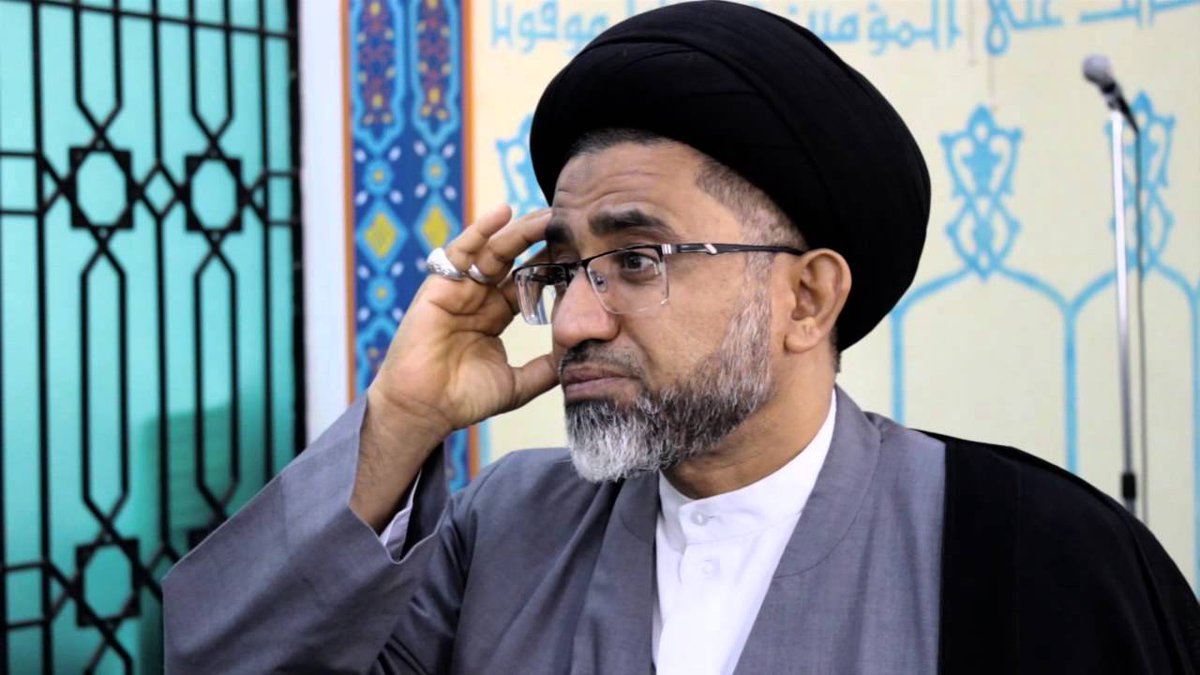**Update 04 February 2019 – Yesterday, Sayed Majeed AlMeshaal was detained for 15 days on the charge of inciting hatred towards the regime and was transferred to Dry Dock Detention Center.
01 February 2019 – On 31 January 2019, Bahrain authorities re-arrested prominent Shia cleric and former Ulema council leader Sayed Majeed AlMeshaal. AlMeshaal’s re-arrest comes just days after his release from prison on 28 January. He had served a two-and-a-half year prison sentence, and was re-arrested after condemning the revocation of Sheikh Isa Qassim’s citizenship and calling for witnesses in Sheikh Qassim’s hometown of Diraz to speak out. Americans for Democracy & Human Rights in Bahrain (ADHRB) expresses concern that AlMeshaal’s re-arrest is a reprisal for his comments. We are additionally concerned that he continues to be targeted over his right to free expression. We call on the Government of Bahrain to immediately release Sayed Majeed AlMeshaal and other unjustly imprisoned Shia clerics, and to provide increased protections for the rights to freedom of expression and assembly.
After his release from prison, authorities called AlMeshaal to Roundabout 17 police station on 30 January, about an hour-and-a-half before he was scheduled to appear at a reception held by local residents. The administration of Ma’tam Saar– a place where events, festivals and religious rituals are held – received threats from the Ministry of Interior upon his release warning them not to hold a welcoming event and government officials established multiple checkpoints throughout the area, but well-wishers proceeded to gather at the home of AlMeshaal. In a statement, he addressed the denaturalization of Sheikh Isa Qassim and noted the importance of witnesses from Diraz to speak out in honor of those who were killed in the protests held outside his house. On 31 January, AlMeshaal was summoned for the second time and detained.
Sayed Majeed AlMeshaal was first called in for interrogation on 16 June 2016 by the Public Prosecution Office concerning his ties to Shia civil society organizations, the Risala Islamic Society and the Islamic Enlightenment Society (Al-Tawiya), and concerning the “illegal collection of money,” or khums – donations solicited by Shia leaders from the community to care for the disadvantaged. He was among five clerics to be summoned for interrogation shortly after the denaturalization of prominent cleric Sheikh Isa Qassim on similar charges. In the wake of Sheikh Qassim’s citizenship revocation, hundreds of protestors organized peaceful sit-ins surrounding the cleric’s home in the village of Diraz. AlMeshaal was an active participant in the sit-ins, and had been summoned multiple times since their start in June 2016. Weeks after his interrogation on 16 June, security forces raided AlMeshaal’s home and arrested him on 30 July on charges of “inciting others to break the law and take part in an illegal gathering.” On 8 August 2016, his trial opened, but officials did not notify his lawyer of the trial’s timing. The trial was postponed to 17 August.
AlMeshaal’s re-arrest is the most recent development in the targeting and prosecution of Bahrain’s Shia clerics and religious leaders by the Bahraini government. In addition to Sheikh Isa Qassim and AlMeshaal, Bahraini authorities have interrogated, arrested, or prosecuted almost 70 Shia clerics over several months in 2017. Ashura – a prominent holy day for the Shia Muslim community – has also become a target for government harassment and targeting of Bahrain’s clerics and Shia community at large. Prominent Shia clerics such as Hassan Mushaima and Sheikh Ali Salman have also faced repeated government targeting, including the denial of medical treatment in prison and a life sentence for spurious charges of espionage, respectively. During the 2018 Ashura season, ADHRB received reports that, starting on 14 September 2018, at least 15 clerics and orators were harassed by the authorities while officials additionally arbitrarily removed Ashura-related commemorative displays throughout the season. This repeated harassment is part of a long-standing history of marginalization of the Shia community in Bahrain, which has sought to largely exclude the population from the national historical narrative, and sectors of the economy and labor force. The kingdom has also largely sought to whitewash domestic marginalization abroad, boasting about Bahrain’s religious tolerance with the King Hamad Center or Religious Tolerance and Peaceful Co-Existence, whose recent visit to Washington DC, hailed Bahrain’s “religious concord.” However, AlMeshaal’s re-arrest demonstrates the government remains intent on targeting the Shia community.
“While Bahrain continues to push a publicity campaign promoting the kingdom’s “religious tolerance,” Shia religious leaders like Sayed Majeed AlMeshaal serve as a reminder that the Bahraini Shia community continues to be marginalized and silenced in Bahrain,” says ADHRB Executive Director Husain Abdulla. “AlMeshaal’s re-arrest signals that officials disregard the Shia community’s right to free expression and assembly. The Bahraini government must release AlMeshaal immediately, ceasing to target and marginalize the Shia community and protecting their fundamental freedoms.”
The re-arrest of Sayed Majeed AlMeshaal so soon after his release following statements made after his release raises questions of the Bahraini’s government intent in silencing its critics in the Shia community and perpetuates the continued marginalization of the Shia population. If Bahrain is to boast religious tolerance abroad, it must first provide its majority Shia population with full access to fundamental freedoms. We call on Bahrain to immediately and unconditionally release Sayed Majeed AlMeshaal and all other Shia clerics held for charges relating to free assembly and free expression. We further call for the Bahraini government to provide for the full exercise of the rights to free expression and assembly for the Shia community without fear of reprisal, especially in regards to human rights abuses, and to cease its marginalization and targeting of Shia clerics and Bahrainis.





